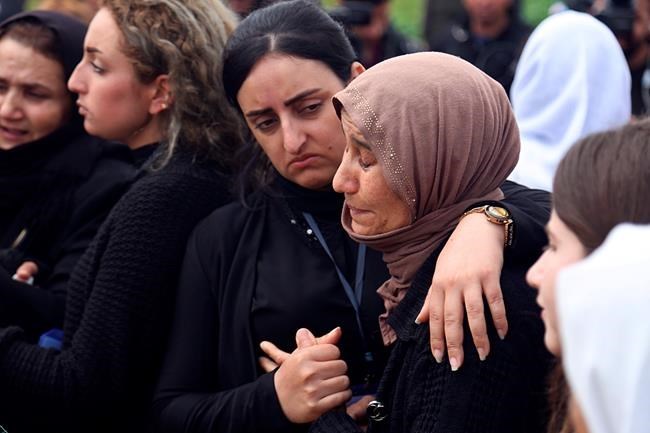
FILE - In this March 15, 2019 file photo, Iraqi Yazidi women mourn during the exhumation process of a mass grave in Iraq's northwestern region of Sinjar. The head of Iraq's forensics administration said Sunday, June 9, 2019, that his office will begin DNA testing to identify the remains of 141 bodies found in mass graves, believed to contain the Yazidi victims of the Islamic State group's campaign of massacres five years ago. (AP Photo/Farid Abdulwahed, File)
Republished June 09, 2019 - 8:24 AM
Original Publication Date June 09, 2019 - 6:21 AM
BAGHDAD - Iraq will use DNA testing to identify the remains of 141 bodies found in mass graves believed to contain the Yazidi victims of Islamic State group massacres, the head of the country's forensics administration said on Sunday.
Zaid al-Yousef said Yazidi survivors helped to locate the 12 graves in the Sinjar region in north Iraq.
Iraq is working to exhume remains from mass graves for forensic evidence of the IS group's crimes when it ruled over parts of the country's north from 2014 to 2017. It is supported by a special U.N. investigations team.
The Sunni Muslim extremists did not tolerate other faiths and tried to exterminate the Yazidis, a religious minority with beliefs that distinguish them from Muslim and Christian worshippers in the region.
IS followers said the Yazidis were "apostates" and killed hundreds of men while enslaving thousands of women and children. The U.N. called it a genocide.
Yazidi groups say the process of exhuming graves and identifying victims is moving too slowly.
"We feel there is some neglect of the issue," said Ali Khedhir, the head of the Yazidi spiritual council office in the village of Lalesh, the spiritual home of the faith.
Since the 2003 U.S. invasion, the Yazidis have suffered from discrimination and persecution by extremist movements among the Muslim Arab population in the ethnically mixed region. The Yazidis speak Kurdish but identify as their own ethnic community.
Now the Yazidis believe their Arab neighbours participated in the massacres against their community, and Iraqi officials are afraid of stirring up tensions with their investigations of the graves, said Khedhir.
Tens of thousands of Yazidis are still living in camps outside Sinjar. Widespread destruction of their homes and persistent insecurity have dissuaded them from returning to their villages.
In March, Iraq and the U.N. began exhuming graves in the village of Kocho, where Islamic State militants are believed to have massacred hundreds of Yazidis in August 2014.
Another 3,000 Yazidis are still missing after they were abducted from Sinjar by IS militants. The survivors are believed to be living among IS families held in detention by Syrian Kurdish forces in neighbouring Syria.
Al-Yousef, the director of Iraq's Department of Forensic Medicine, told The Associated Press on Sunday it will take until August to identify the 141 bodies transferred to Baghdad from Sinjar for DNA testing.
The investigation is being hampered by a lack of survivors and hesitation among relatives of the dead to come forward with DNA samples, said al-Yousef. Investigators require DNA samples from three relatives to identify each victim. The U.N. is searching for relatives of the deceased in other countries and seeking to obtain DNA samples to assist the investigation, he added.
"The Yazidi investigation is the most difficult we have ever come across," said al-Yousef.
---
Associated Press writer Salar Salim in Irbil, Iraq contributed to this report.
News from © The Associated Press, 2019